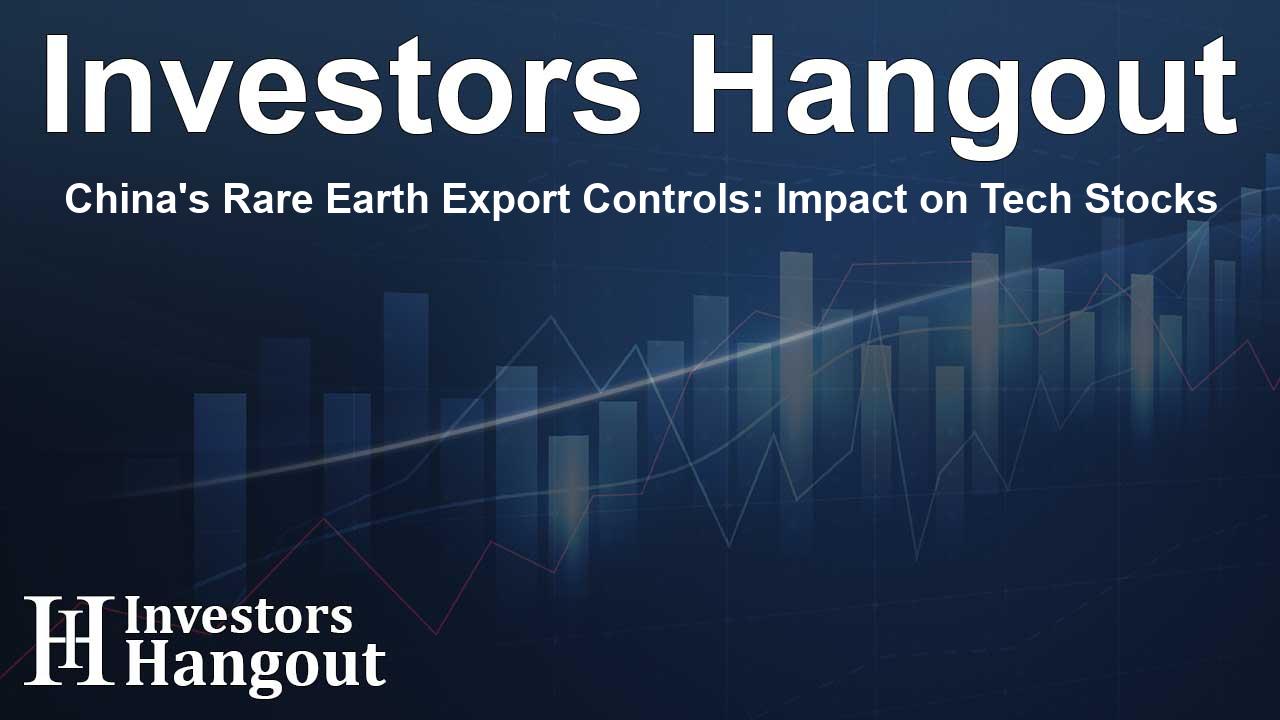China's Rare Earth Export Controls: Impact on Tech Stocks

China's Rare Earth Market and Export Controls
The recent tightening of rare earth export controls by China has stirred unrest among U.S.-listed Chinese stocks, including Alibaba (NASDAQ: BABA), Baidu (NASDAQ: BIDU), Nio (NYSE: NIO), PDD Holdings (NASDAQ: PDD), and XPeng Inc (NYSE: XPEV). This regulatory change comes amid rising geopolitical tensions, primarily between Beijing and Washington, and has resulted in these stocks experiencing extended losses.
Implications of the New Regulations
The new regulations, introduced to strengthen China's grip on this crucial resource, add five new elements to export controls while expanding oversight for semiconductor users. These changes are seen as a strategic move ahead of trade negotiations, emphasizing China's dominance in supplying over 90% of the world’s processed rare earth elements.
Impact on Global Supply Chains
Under these new rules, foreign manufacturers utilizing Chinese materials or equipment now require licenses to operate, creating parallel supply chains reminiscent of U.S. sanctions. This shift is likely to force many companies to reevaluate their dependency on Chinese rare earth elements and find alternatives, potentially reshaping the global market for these resources.
Simultaneous Crackdown on Semiconductor Imports
Alongside the new export controls, China has initiated a customs crackdown on AI chips imported from companies like Nvidia (NASDAQ: NVDA). Customs officers are now mandated to enforce stricter inspections, particularly targeting Nvidia’s processors designed for the Chinese market, which were intended to bypass past U.S. export restrictions. This reflects an intensified effort by China to lessen its reliance on foreign technology.
Response from Chinese Companies
In light of these developments, Chinese tech giants are accelerating domestic semiconductor production as a countermeasure to the restrictions imposed on foreign products. This move reveals a strategic pivot towards ensuring an autonomous technology ecosystem within China, which could diminish the market share of Western firms in the long term.
Stock Performance Amidst Tensions
Market reactions have been palpable. In premarket trading, BABA saw a decline of 2.41% to $169.50, while BIDU fell 2.52%, NIO dropped 0.94%, and XPEV decreased by 2.49%. PDD also faced a slip of 1.79%. This testament to the volatility in these stocks underlines the apprehension investors feel amid the evolving geopolitical landscape and altered regulatory frameworks.
Future Outlook for Affected Companies
As foreign relations evolve, the fortunes of affected companies may hinge on their abilities to adapt. Firms like Alibaba, Baidu, and Nio will need to navigate this tightening grip on rare earth elements and semiconductor technologies while pursuing innovation and ensuring stockholder confidence.
Conclusion: The Road Ahead
China's latest policies signal a profound shift with significant implications for global trade in high-tech sectors. Companies heavily reliant on rare earths must now contend with increased operational complexities as they strategize to mitigate supply risks and maintain their competitiveness in a tightening marketplace.
Frequently Asked Questions
What are rare earth elements?
Rare earth elements are a group of 17 essential metals required in various high-tech applications, from electronics to clean energy technologies.
Why is China so important in the rare earth market?
China dominates the global processing of rare earth elements, controlling over 90% of the supply chain, which is vital for industries like electronics and renewable energy.
What impact do China's export controls have on technology companies?
The controls can restrict access to critical materials, impacting production and innovation, leading to stock declines as seen with companies like Alibaba and Nvidia.
How are companies adapting to these changes?
Many firms are investing in domestic production capabilities and exploring alternative materials to mitigate risks associated with supply disruptions.
What does the future hold for U.S.-listed Chinese stocks?
As geopolitical tensions grow, U.S.-listed Chinese stocks may continue to experience volatility, making strategic adjustments essential for long-term success.
About The Author
Contact Kelly Martin privately here. Or send an email with ATTN: Kelly Martin as the subject to contact@investorshangout.com.
About Investors Hangout
Investors Hangout is a leading online stock forum for financial discussion and learning, offering a wide range of free tools and resources. It draws in traders of all levels, who exchange market knowledge, investigate trading tactics, and keep an eye on industry developments in real time. Featuring financial articles, stock message boards, quotes, charts, company profiles, and live news updates. Through cooperative learning and a wealth of informational resources, it helps users from novices creating their first portfolios to experts honing their techniques. Join Investors Hangout today: https://investorshangout.com/
The content of this article is based on factual, publicly available information and does not represent legal, financial, or investment advice. Investors Hangout does not offer financial advice, and the author is not a licensed financial advisor. Consult a qualified advisor before making any financial or investment decisions based on this article. This article should not be considered advice to purchase, sell, or hold any securities or other investments. If any of the material provided here is inaccurate, please contact us for corrections.
